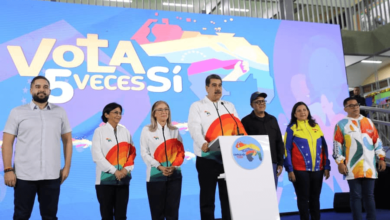On Dec. 3, Venezuelan president Hugo Chávez won reelection for a third term in a landslide. Chávez earned nearly 63 percent of the vote—more than 20 points over his main opponent, Manuel Rosales. The elections were monitored by hundreds of international observers to ensure fairness.
Throughout the campaign, Chávez stressed the importance of the Bolivarian revolution, redistribution of oil wealth to
|
Rosales, a pro-imperialist governor of the oil-rich state of Zulia, based his campaign on promoting so-called free-market policies and attracting foreign investment. He was supported by the U.S. government. Unsurprisingly, most of the right-wing and pro-imperialist forces rallied behind Rosales.
The overwhelming reelection of Chávez demonstrates that the Venezuelan people continue to support the Bolivarian revolution and its government. Under Chávez’s leadership, the government has channeled billions of dollars of oil money into social welfare programs that benefit the poor.
Minutes after the election results were announced, thousands of Chávez supporters gathered outside the Miraflores presidential palace, despite the rain, to hear him speak. Chávez said, “This Dec. 3 is a starting point. A new era has begun that will have as its fundamental strategic line the deepening of the Bolivarian revolution, on the Venezuelan road to socialism.
“Those who voted for me, didn’t vote for me, they voted for a socialist project to construct a profoundly different Venezuela, they voted for a project, they voted for a profound consciousness.”
President Chávez declared war to the death against corruption, and said a new Bolivarian morality must be created. He dedicated his victory to Simón Bolívar and also to Cuban president Fidel Castro and the Cuban socialist revolution.
“Today we have given a lesson of dignity to U.S. imperialism,” Chávez added. “This is another defeat for the devil,” referring to U.S. president George Bush. “Venezuela has independence. Venezuela is free. Venezuela will never be a North American colony.”
Efforts to undermine the Bolivarian revolution
Chávez’s victory is especially triumphant when considering the U.S. threats and destabilization campaign aimed at undermining the Bolivarian process.
Leading up to the election, the U.S. government funneled more than $26 million to right-wing groups in order to undermine Chávez’s overwhelming popularity.
U.S. funds are funneled to right-wing opposition groups via imperialist institutions such as the U.S. Agency for International Development and the National Endowment for Democracy. These institutions claim that their mission is to “support democracy,” but, according to former CIA agent Philip Agee, their real purpose is “to support a government that is favorable to U.S. interests and avoid the coming to power of forces that are not seen as favorable to U.S. interests.” (Flashpoints Radio, March 24, 2005)
The United States has funded more than 132 grants to different right-wing groups in Venezuela, including ones that openly aim to undermine land reforms that transfer unused ranches owned by large landowners to landless peasants. For groups such as these to get tens of thousands of dollars from USAID, it is easy as filling out a one-page form off the Internet.
The U.S. government has also used military threats in its attempts to destabilize Venezuela. The latest threat was
|
Further, the U.S. government is threatening to apply Title III of the 1996 “Cuban Liberty and Solidarity Act,” known as the “Helms Burton Act,” to Venezuela for supporting socialist Cuba. Application of Title III would allow people to sue Venezuela in U.S. courts over property the Cuban government nationalized after the 1959 revolution.
In addition, Venezuela is reorienting its trade to make China a primary commercial partner. This will allow Venezuela to enjoy continued economic independence from the United States. The transition is no doubt intensifying U.S. threats and destabilization campaigns.
Revolutionary gains
The reelection of Chávez demonstrates that, despite incessant threats and destabilization campaigns from the United States, the Venezuelan people support the Bolivarian revolution and its progressive gains. The revolution has implemented numerous social welfare programs, created jobs and, thereby, raised living standards for workers and peasants.
Externally, Venezuela has provided anti-imperialist solidarity and critical economic assistance to oppressed countries in Latin America, the Caribbean, and Africa and around the world.
Even workers in the United States have benefited from the Bolivarian revolution. Venezuela continues to deliver millions of dollars worth of oil to certain working-class communities in the United States at reduced rates.
U.S. government efforts to destabilize the Venezuelan government likely will not cease in the near future. Revolutionaries and progressives in the United States must be prepared to defend the gains of the Bolivarian revolution. U.S. hands off Venezuela!








